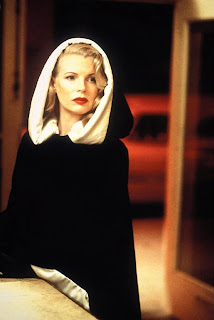Wise: What's that, Werth?
Werth: I'd really like to thank the Acadamy.
Wise: Because they like you, they really like you?
Werth: No, because the Oscar telecast finally recognized Oscar losers. I'm not gonna say that host Seth MacFarlane and Kristin Chenoweth stole our idea, but we have mined this territory twice before.
Wise: It seems Mr. MacFarlane did a lot of things to ruffle people's feathers at the Oscars.
Werth: One person who must have been super ruffled was legendary film director, Steven Spielberg. His hugely successful bio-pic Lincoln lost Best Picture and, more surprisingly, Best Director.
Wise: And not just because historical bio-pics are usually a shoo-in at the Academy Awards.
Werth: But Spielberg might be used to losing Oscars on his slavery-themed movies. The Color Purple (1985) was famously nominated for 11 Oscars and lost every single one. But perhaps less remembered is Spielberg's cinematic treatment of a group of Africans who escape a slave ship in 1839, only to be put on trial here in America, Amistad (1997). The film was nominated for four Oscars and lost them all.
Wise:Most of the gold that year went to another film about an ill-fated ship.
Werth: Amistad is based on the true story of a group of Africans who are kidnapped and sent to Cuba before rising up against their captors, slaying them, and then trying to steer their boat home. Unfortunately they wind-up off Long Island, and are soon in shackles again for murder.
They become the center of an international property dispute that quickly leads to Presidential involvement due to the case's ramifications to American slavery. It's the sort of epic human issue canvas that Spielberg loves to paint on.
Wise: Munich, anyone?
Werth: The film veers between heavy-handedness, perceptive humor and stark, shocking realism, but the real joy in this film is to watch the performances. Morgan Freeman gives his typical charming and noble turn as freed slave Theodore Joadson, and Matthew McConaughey is spunky and eager as the defense attorney for the Africans, Roger Sherman Baldwin.
But the two standouts are Djimon Hounsou as Cinque and Anthony Hopkins as former president John Quincy Adams. Hounsou is a revelation, his imposing screen presence a mix of sheer physical size, vocal roar, and intensity.
Hopkins works magic by throwing himself whole hog into this addled and rickety, irascible and brilliant man. The scene where we first see Adams "napping" in Congress is textbook perfection of how to introduce a character with only a simple shot and one line of dialogue.
Hopkins lost the best Supporting Oscar to Robin Williams in Good Will Hunting and Spielberg wasn't even nominated. So my guess is Spielberg will avoid slavery flicks for a little while.
Wise: Perhaps there's no better example of an Oscar loser than Bette Davis in Of Human Bondage (1934). Based on the novel by W. Somerset Maugham, the film also stars Leslie Howard as Philip Carey, a club-footed aesthete who abandons his dream of studying art in Paris and returns to study medicine in London where he falls for cockney waitress Mildred (Davis). He lavishes attention on her, but she prefers the company of wealthier men who enjoy life's rowdier pleasures and aren't burdened by a dysfunctional leg.
Werth: I'm with ya' Mildred.
Werth: But Mildred's more fun.
Wise: This was the picture that made Davis' career. She had been laboring in smaller films at Warner Bros., but when Bondage director John Cromwell caught of preview of one of Davis' performances, he insisted on borrowing her for the film. Legend has it that the Warner brass was happy to have the tempestuous actress off the lot for a few weeks, but were furious when their contract player was transformed into a star by another studio and quietly encouraged the Academy not to nominate Davis.
A furious write-in campaign erupted, but despite the best efforts of her peers, Davis still lost the Oscar to Claudette Colbert for It Happened One Night. Still, Davis is magnificent playing both the slatternly Mildred and Philip's fantasy vision of her: tender, compliant, virginal in softly-lit, frothy white dresses. She even gets an incredible breakdown scene where she rages at Philip's impotence and later almost destroys his chances of finishing medical school.
Werth: No actress has ever done as much with the line "Wipe my mouth."
Wise: It's really an amazing performance, full of vibrance, passion, and wit.
Werth: Which is more than I can say for this year's Oscars ceremony.
Wise: Perhaps next year we can host— but until then, check in next week for more Film Gab!


















































